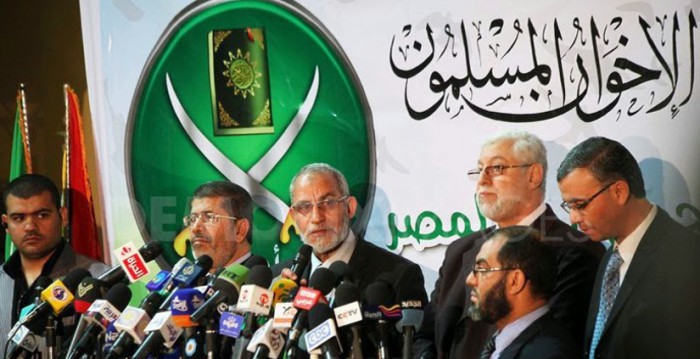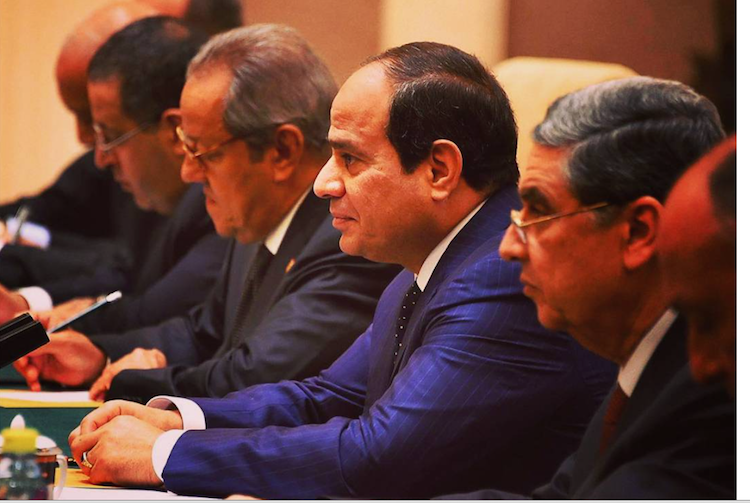It is more often that we hear questions such as why do people comply with authoritarian exploitation? Why don’t they rebel, reform or change the status quo? Don’t they like to live in a democratic system? And many other questions. Well, People are more likely to wish for the end of authoritarian exploitation, but they lack the collective organization to do otherwise. Thus, the answer is more related to organizational issues than people’s aspirations. People are organizationally outmanoeuvred by ruling elites. Their rebellion against authoritarianism is more likely to serve dictators than populations.
Let’s take Egypt as an example: When people in Egypt were subjected to authoritarian rule since independence, they were controlled by military, police and political elites at the top (what can also be called the ruling blocs). The masses complied for over 60 years because they lacked collective organization to do otherwise. Any involvement of people in decision-making processes meant a loss of power to the regime in control. Therefore, the regime under Nasser, Sadat, Mubarak and most notably Al-Sisi created structures to guarantee their survival. Organization and reorganization of ideological, political, economic and military networks were enforced through coercion and imposition, even if some (mostly incapable to make fundamental change) rebelled and resisted.
However, by 2011, the collective incapacity to change the status quo in Egypt turned into a collective action resulting in mass protests on a huge scale. While these dynamics are dialectical and intertwined, a division of labour among the elites of the ruling blocs occurred in an attempt to counterbalance the collective action of the public. After the fall down of Mubarak, this collective action brought new elites to share power such as the Muslim brothers and Salafi parties. Due to the power struggle among political yet conflicting actors, it was necessary for the regime, namely the military and police forces, to outflank the organization of rival actors to remain in power.

The Muslim Brotherhood was later banned while Salafi parties were generally co-opted. This process was set up through conflict and cooperation to achieve the actors’ conflicting interests and goals taking the form of institutionalized laws and norms of social life. These shifts towards institutionalization of social life grant the ruling blocs a license to overlook the whole and reorganize power networks, keeping the bottom compliant. Any dissenting actors outside the institutionalized realm of social life become illegitimate and can be coercively outflanked. It is most obvious when we consider the crackdown against the Muslim Brotherhood and their protests against the military coup in 2013. Under the interim President Adli Mansour, the new coup elite passed a new protest law under the act 107 on 24 November 2013, by which the Ministry of Interior has the right to cancel, postpone or move any protest if serious intelligence suggests that the protestors might breach the law. This law was an implementation of the Constitutional Declaration issued on 08 July 2013, only five days after the deposal of the Islamist President Mohammad Morsi.
We can see dynamics of two configuration of power. The power over people by imposition and coercion, and that is coordination. And the power through people by sharing a collective understanding, and that is cooperation.
Due to the fact there has not been an elected parliament in Egypt since 2013, Al-Sisi enjoys the privilege of passing laws in the form of decrees and impose his will despite people’s resistance (preventing the bottom from sharing control). The assassination of Hisham Barakat in a car bomb on 29 June 2015, the Prosecution General of Egypt and the architect of thousands of prosecutions including controversial death sentences against Muslim Brotherhood followers can be easily, and actually already, politicized increasing Al-Sisi’s function in communication and interaction networks and granting him more organizational superiority over Egyptians.

At Barakat’s funeral, President Al-Sisi promised to amend the laws to make them responsive to the implementation of justice. “Under such circumstances, courts are useless and so are laws … The arm of justice is chained by the law,” said Al-Sisi promising to carry out any death or lifetime sentences against what he called “terrorists”. Consolidating his distributive power faster than any other dictator in the Middle East to impose his decisions over the Egyptian population and territory, Al-Sisi co-opted the judicial system as well as communications means. Succeeding in doing so, Al-Sisi controls the means of persuasion (institutionalized means) – the law, government loyal clergy and media – and the means of coercion – military, police and security forces.
Thus, people comply because they don’t know how or have the means to change power networks and organizations. They are embedded in organizational power structures, which they don’t control. They are bypassed and weakened by those at the top to make a significant change. This pattern doesn’t apply only to Egypt, but rather to the whole Middle East and North Africa region. It is not going well for Syrians nor Yemenis or Libyans. Revolutions often do not serve people’s aspirations. It seems it is too difficult to turn incapacity of people into a collective capacity for a long time.
As George Orwell said in his novel Nineteen Eighty-Four: “One does not establish a dictatorship in order to safeguard a revolution; one makes the revolution in order to establish the dictatorship.”


